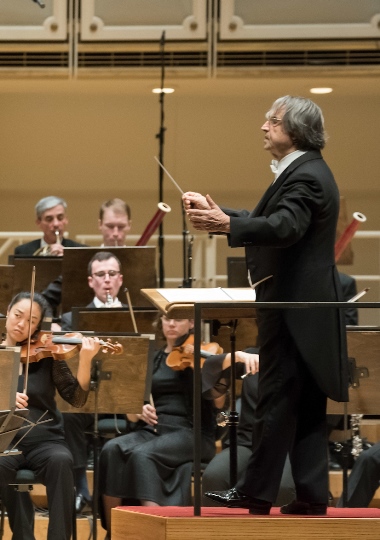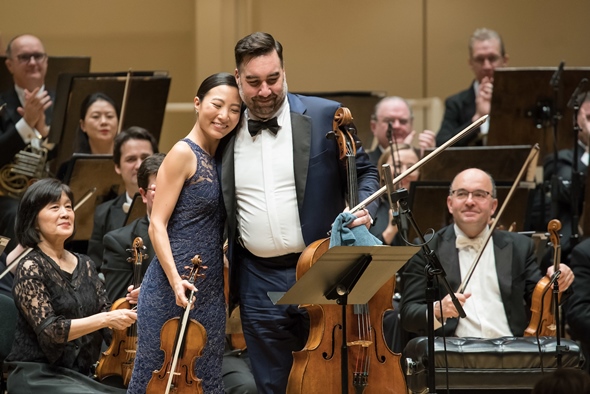Muti goes all in with German Romantic music, as a pair of soloists from CSO light up Brahms

CSO associate concertmaster Stephanie Jeong and assistant principal cello Kenneth Olsen played Brahms’ Double Concerto. (Anne Ryan photos)
Review: Chicago Symphony Orchestra conducted by Riccardo Muti. Stephanie Jeong, violin; Kenneth Olsen, cello. Repeats Nov. 9 & 12.
By Lawrence B. Johnson
Maybe it’s just in keeping with his season-long Beethoven theme, but Chicago Symphony music director Riccardo Muti’s program for concerts Nov. 7-12 at Orchestra Hall is planted squarely at the heart of German Romanticism after Beethoven’s death in 1827.
Wagner. Schumann. Brahms. Theodore Thomas, the CSO’s founding music director, might have put together just such a bill of fare in the 1890s, except then Brahms’ Concerto for Violin and Cello would have been (nearly) contemporary music, and even the “Flying Dutchman” Overture would have borne an echo of the lately deceased Wagner’s bold spirit.
But bold does not describe this program in 2019. Curious, perhaps. The narrowly echt German experience reminded me of my early days as a critic in Milwaukee half a century ago. All that was missing here were the brats and sauerkraut.
To be fair, Muti gets points – in fact, double points – for Brahms’ seldom encountered Double Concerto; double points because the music director entrusted the work’s formidable solo voices to a pair of very bright stars from the Chicago Symphony strings: associate concertmaster Stephanie Jeong and assistant principal cello Kenneth Olsen.
In a performance that captured the essential, if deceptive, intimacy of Brahms’ rather daunting concerto, Jeong and Olsen met the work’s basic requirement of spiritual fellows displaying equal mastery and readiness to share the spotlight.
The Double Concerto, Brahms’ last major orchestral work, presents a somewhat gnarly aspect that can veil what is in truth a deep stream of lyric radiance. Olsen took the performance immediately to that place with a lingering opening solo delivered with easy, expansive warmth – a disposition sweetly emulated in Jeong’s first flourish, long-lined and sparkling.
So it went, through an opening movement that Brahms cast in a dichotomy of conflict and grace, struggle and ascendancy. The two soloists shone especially on the gentler side of that divide. And so, not surprisingly, their soulful convergence in Brahms’ ruminative slow movement came with conviction, eloquence and poise.
For even such polished musicians as Jeong and Olsen, whose art-in-trade is to fit within an orchestral ensemble, stepping into the spotlight is a bit like changing stripes to spots. By the time they got to the concerto’s impulsive, dancing, devil-may-care finale, any hint of reticence had vanished. They simply went for it, and the result was grand, rollicking and impressively virtuosic fun.
Muti was the ever-attentive collaborator, and the orchestra’s partnership was as vital as it was carefully calibrated. The audience saluted Jeong and Olsen like the family they are, with a ripping ovation that brought them back for multiple curtain calls.
The concert began in the familiar realm of Wagner’s thoroughly Romantic “Dutchman” Overture, upon which Muti and the CSO lavished an opulent wash of sound worthy of the emotional seascape at the opera’s figurative center.
Generous, too, but singularly odd was Muti’s almost languid turn through Schumann’s Symphony No. 3 in E-flat (“Rhenish). Essentially a series of tableaux evoking scenes – or, as Beethoven said of his “Pastoral” Symphony, feelings – along the Rhine, Schumann’s symphony indeed harkens back to the “Pastoral,” even to its five-movement scheme.
From the outset, a first movement Schumann marked “Lebhaft” (or lively), Muti imposed his own idea of what that term might mean – and it came across as indulgent, expansive, contemplative. Maybe a little slow.

CSO music director Riccardo Muti signaled “All rise” in honor of three retiring members of the orchestra on whom he had just conferred the Theodore Thomas Medallion for Distinguished Service: from left, bassist Roger Cline, violist John Bartholomew and violist Daniel Orbach.
Turn by turn, through a leisurely scherzo that Schumann himself tagged “Sehr mäßig” (very moderately) and a penultimate movement suggestive of the shadowy grand interior of Cologne Cathedral, Muti hewed to his deliberate tempos – allowing the orchestra to bathe the music in its luxurious sound.
If not always, at least in many performances, the darkly hovering “cathedral” music gives way instantly, without a break, to the finale’s sunburst in E-flat major – again stamped Lebhaft. That liveliness simply didn’t happen here. Muti brought the performance to a complete stop before the finale, then meandered into it like a tourist who might be pondering his map as he ambles along the Strasse.
Nor did the pace ever pick up. My internal metronome, set from a lifetime of listening, was ticking a lot faster. But Muti wasn’t hearing it. He was in a more mellow mode. The orchestra sounded marvelous, in a sort of low-energy way.
Before the concert’s second half began, three retiring members of the Chicago Symphony were presented the Theodore Thomas Medallion for Distinguished Service: Violist John Bartholomew, who joined the orchestra in 1980; bassist Roger Cline, a member since 1973; and violist David Orbach, a member since 1988. They were introduced by CSO president Jeff Alexander, and each received his medallion from Muti.
Related Link:
- Performance and ticket info: Details at CSO.org



